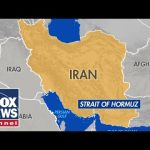In escalating tensions in the Middle East, U.S. military bases have been put on high alert as Iran vows to retaliate against recent actions taken by the United States. The unfolding drama is reminiscent of a high-stakes chess game, one in which each move carries substantial weight and the pressure is palpable. Protests erupted in Tehran as anti-American sentiment surged, with many on the streets expressing their discontent. Meanwhile, President Trump has hinted at a possible regime change in Iran, leaving many to ponder what that might mean for the balance of power in the region.
The situation gained further attention with the recent military actions spotlighted by a barrage of missiles being launched toward Israel, causing sirens to blare across the nation. Reports indicated that at least one rocket managed to hit near the Tel Aviv and Gaza Strip area. In a move that could only be described as bold, Israeli Prime Minister Benjamin Netanyahu explained that Iran is on the brink of achieving the capability to produce nuclear weapons and that Israel must act decisively to hinder this ambition. With enriched uranium in their possession, it seems that the clock is ticking, and Israel is not willing to take any chances.
The planning of a military operation of this magnitude is no small feat. It has reportedly taken weeks for the U.S. military and its allies to map out a strategy that not only deters Iran but also protects their interests. With Vice President J.D. Vance at the forefront of diplomatic communications, the administration has not altogether closed the door to negotiations, even as military strikes were planned and executed. The end goal appears focused not on regime change but rather the elimination of Iran’s nuclear capabilities—a careful distinction aimed at reducing potential backlash.
Former military personnel have weighed in on the complexities of this operation, where meticulous planning and execution played critical roles. A former U.S. Marine highlighted the challenges of carrying out such dangerous missions, especially in coordinating multiple aircraft and ensuring effective communication. The thrill of intercepting and outsmarting an adversary during a high-pressure operation can be exhilarating for military professionals, but it’s also fraught with risks that can make or break the mission. It is said that the execution was flawless, much to the surprise of many experts in the field.
While the political environment and global sentiment remain in flux, the actions taken by the Trump administration have drawn both praise and caution. The idea that Iran may be on the edge of acquiring nuclear capabilities has raised alarms not only in the U.S. but around the world. As discussions of diplomacy continue to be weighed against military might, it remains to be seen how this geopolitical chess match will unfold. With Iran pledging to respond and tensions escalating, one thing is clear: the stakes have never been higher, and the world is watching closely. The American military’s ability to perform under pressure and maintain security while navigating these murky waters will be critical in the days to come.




